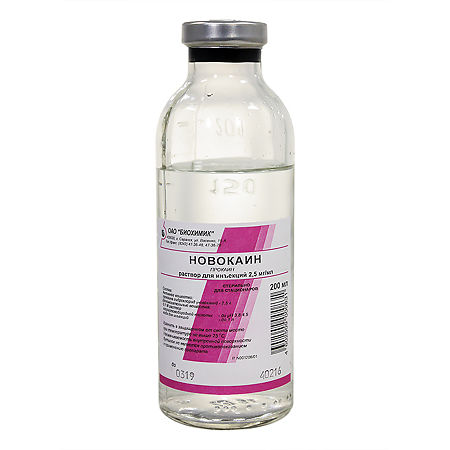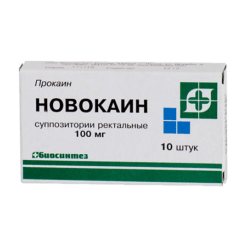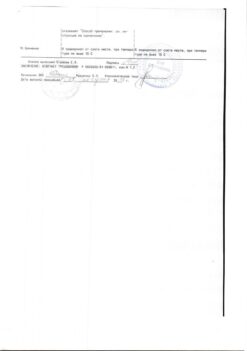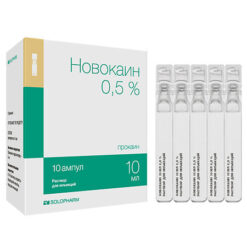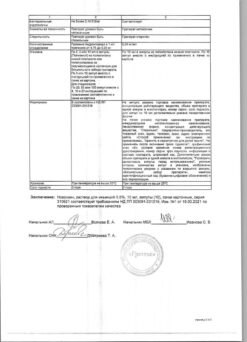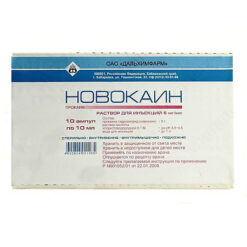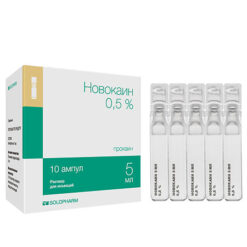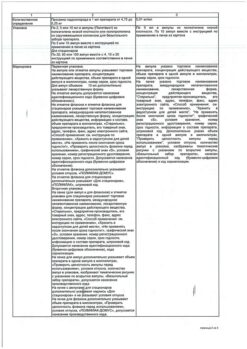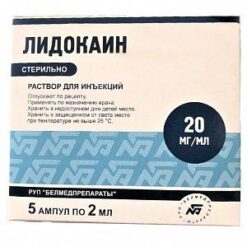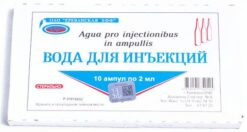No products in the cart.
Novocaine, 0.25%, 200 ml
€1.00
Out of stock
(E-mail when Stock is available)
Description
Novocaine is a local anesthetic.
It accumulates in the membranes of nerve fibers and endings and interacts with receptors located in potential-dependent sodium channels.
Maintains membrane permeability to sodium ions, preventing the onset of an action potential and the conduction of the pain impulse.
Indications
Indications
Infiltration, conduction, epidural and spinal anesthesia; vagosympathetic and paranephral blockade; pain syndrome in gastric and duodenal ulcers, hemorrhoids, nausea.
Active ingredient
Active ingredient
Composition
Composition
Active ingredients:
Procaine hydrochloride 2.5 mg
How to take, the dosage
How to take, the dosage
In local anesthesia the dose of the drug depends on the concentration, the nature of surgical intervention, method of administration, condition and age of the patient.
In case of paranephral blockade 50-70 ml of 0.5% (5 mg/ml) Novocain solution is injected into the perinephric tissue in adults.
For infiltration anesthesia, the following highest doses (for adults) are established: the first single dose at the beginning of surgery is 0.75 g (i.e., 150 ml of 0.5% Novocaine solution).
Thereafter during each hour of surgery not more than 2 g (i.e. 400 ml of 0.5% novocaine solution).
Interaction
Interaction
Prolongs neuromuscular blockade caused by suxamethonium (because both drugs are hydrolyzed by plasma cholinesterase).
The use simultaneously with MAO inhibitors (furazolidone, procarbazine, selegelin) increases the risk of arterial hypotension.
The toxicity of procaine is increased by anticholinesterase drugs (which inhibit its hydrolysis). The metabolite of procaine (para-aminobenzoic acid) is a competitive antagonist of sulfonamide preparations and may weaken their antimicrobial effects.
The treatment of the injection site of the local anesthetic with disinfectant solutions containing heavy metals increases the risk of local reaction in the form of soreness and swelling.
Potentiates the effect of direct anticoagulants.
Preprat reduces the effect of anticholinesterase agents on neuromuscular transmission.
Cross-sensitization is possible.
Contraindications
Contraindications
Hypersensitivity.
Side effects
Side effects
Dizziness, weakness, hypotension, allergic reactions.
Overdose
Overdose
Symptoms: pallor of the skin and mucous membranes, dizziness, nausea, vomiting, increased nervous excitability, cold sweats, tachycardia, decreased blood pressure almost to collapse, tremors, seizures, apnea, methemoglobinemia, respiratory depression, sudden cardiovascular collapse.
The effect on the central nervous system is manifested by feelings of fear, hallucinations, seizures, motor agitation. In cases of overdose the drug administration should be stopped immediately. In case of local anesthesia the site of injection may be injected with adrenaline.
Treatment: general resuscitation measures, including oxygen inhalation, if necessary, artificial lung ventilation. If convulsions lasted more than 15-20 seconds, they were stopped by intravenous thiopental (100-150 mg) or diazepam (5-20 mg). In arterial hypotension and/or myocardial depression, ephedrine (15-30 mg) shall be administered intravenously, in severe cases, detoxification and symptomatic therapy.
In case of development of intoxication after an injection of novocaine in the muscle of the leg or arm, an urgent tourniquet is recommended to reduce the subsequent entry of the drug into the general bloodstream.
Similarities
Similarities
Additional information
| Weight | 0.440 kg |
|---|---|
| Shelf life | 3 years |
| Conditions of storage | In a place protected from light, at a temperature not exceeding 20 °C. |
| Manufacturer | Biokhimik JSC, Russia |
| Medication form | solution for infusion |
| Brand | Biokhimik JSC |
Other forms…
Related products
Buy Novocaine, 0.25%, 200 ml with delivery to USA, UK, Europe and over 120 other countries.

